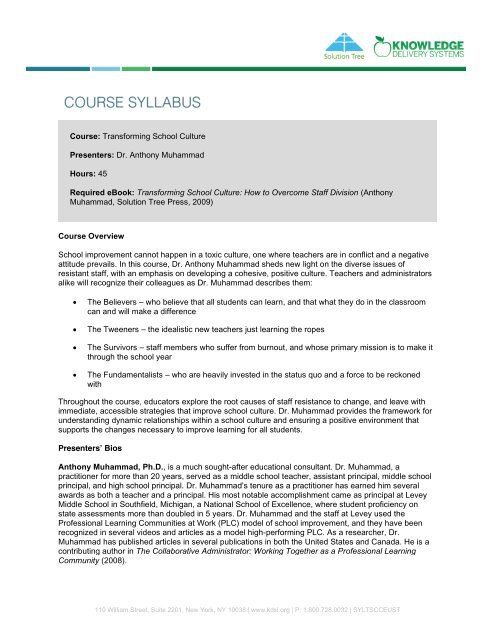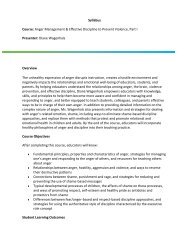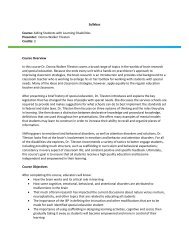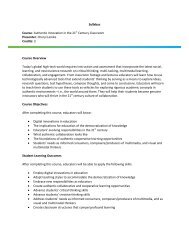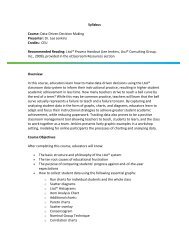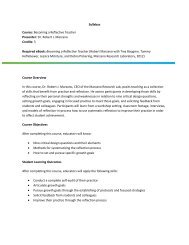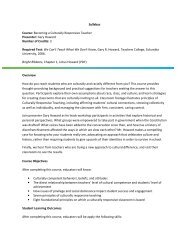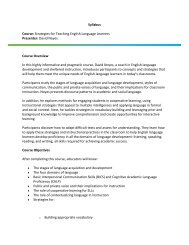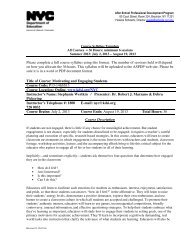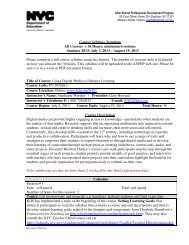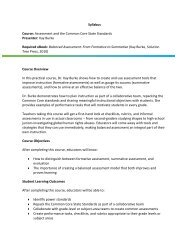COURSE SYLLABUS
COURSE SYLLABUS
COURSE SYLLABUS
You also want an ePaper? Increase the reach of your titles
YUMPU automatically turns print PDFs into web optimized ePapers that Google loves.
Course: Transforming School CulturePresenters: Dr. Anthony MuhammadHours: 45Required eBook: Transforming School Culture: How to Overcome Staff Division (AnthonyMuhammad, Solution Tree Press, 2009)Course OverviewSchool improvement cannot happen in a toxic culture, one where teachers are in conflict and a negativeattitude prevails. In this course, Dr. Anthony Muhammad sheds new light on the diverse issues ofresistant staff, with an emphasis on developing a cohesive, positive culture. Teachers and administratorsalike will recognize their colleagues as Dr. Muhammad describes them:The Believers – who believe that all students can learn, and that what they do in the classroomcan and will make a differenceThe Tweeners – the idealistic new teachers just learning the ropesThe Survivors – staff members who suffer from burnout, and whose primary mission is to make itthrough the school yearThe Fundamentalists – who are heavily invested in the status quo and a force to be reckonedwithThroughout the course, educators explore the root causes of staff resistance to change, and leave withimmediate, accessible strategies that improve school culture. Dr. Muhammad provides the framework forunderstanding dynamic relationships within a school culture and ensuring a positive environment thatsupports the changes necessary to improve learning for all students.Presenters’ BiosAnthony Muhammad, Ph.D., is a much sought-after educational consultant. Dr. Muhammad, apractitioner for more than 20 years, served as a middle school teacher, assistant principal, middle schoolprincipal, and high school principal. Dr. Muhammad’s tenure as a practitioner has earned him severalawards as both a teacher and a principal. His most notable accomplishment came as principal at LeveyMiddle School in Southfield, Michigan, a National School of Excellence, where student proficiency onstate assessments more than doubled in 5 years. Dr. Muhammad and the staff at Levey used theProfessional Learning Communities at Work (PLC) model of school improvement, and they have beenrecognized in several videos and articles as a model high-performing PLC. As a researcher, Dr.Muhammad has published articles in several publications in both the United States and Canada. He is acontributing author in The Collaborative Administrator: Working Together as a Professional LearningCommunity (2008).110 William Street, Suite 2201, New York, NY 10038 | www.kdsi.org | P: 1.800.728.0032 | SYLTSCCEUST
Unit 3: Predetermination (video)Video Lecture.Unit 4: The Framework of Modern School Culture (eBook)Here, Dr. Muhammad looks at the mandate of No Child Left Behind, and the shift ushered in by the publicaccountability movement - from a focus on teacher intentions to a focus on evidence of student learning.He examines the unique human experiences that influence how school culture forms and how well aschool operates: perceptual, intrinsic, and institutional predetermination. Educators share personalexperiences that illustrate the potential effects of predetermination.ObjectivesAfter completing this unit, educators will know:The role of teacher accountability as it is envisioned in a healthy school environmentThe role of perceptual predetermination, i.e., the impact of an educator’s socialization on practicein the classroomThe role of intrinsic predetermination, i.e., the messages students internalize from home,community, and school about the probability of their school successThe role of institutional predetermination, i.e., the “system of sorting” that identifies students’proficiency and tracks them accordinglyLearning OutcomesAfter completing this unit, educators will apply the following skills:Analyze the role of perceptual, intrinsic, and institutional predetermination in their own schools ordistrictsUnit 5: Encouraging Believers (video)Video Lecture.Unit 6: The Believers (ebook)In Unit 5 and its companion eBook chapter, Dr. Muhammad explores the first of four groups of teachersidentified through the interviews and observations collected from public schools across the country: theBelievers. Believers are the teachers administrators would clone if they could; they believe passionatelyin the goal of success for every student, and go to great lengths to achieve this goal. Dr. Muhammaddescribes what Believers bring to the culture of a school, and cites a need for Believers to become moreactive and aware in challenging day-to-day assaults on the belief system that frames their practice.Administrator interviews provide real-world examples of the Believers’ role in a healthy school culture.110 William Street, Suite 2201, New York, NY 10038 | www.kdsi.org | P: 1.800.728.0032 | SYLTSCCEUST
ObjectivesAfter completing this unit, educators will know:The characteristics of BelieversBelievers’ potential effect on school cultureLearning OutcomesAfter completing this unit, educators will apply the following skills:Identify the Believers in their schools/districts and implement steps to support themUnit 7: Connecting Tweeners (video)Video Lecture.Unit 8: The Tweeners (eBook)New teachers, aka Tweeners, are the topic of discussion here, and they are critical players in the questfor a healthy school culture. Loosely connected to the school and community and vulnerable to all of thestressors of the profession, Tweeners seek comfort and stability within the organization. Historically poorteacher retention rates make supporting new teachers an essential priority. (50% leave the professionafter 5 years; this number grows to 70% in rural and urban areas.) School administrators weigh in.ObjectivesAfter completing this unit, educators will know:The characteristics of TweenersTweeners’ potential effect on school culture, especially in light of research on new teacherretentionLearning OutcomesAfter completing this unit, educators will apply the following skills:Identify the Tweeners in their schools/districts and implement steps to support themUnit 9: Supporting Survivors (video)Video Lecture.110 William Street, Suite 2201, New York, NY 10038 | www.kdsi.org | P: 1.800.728.0032 | SYLTSCCEUST
Unit 10: The Survivors (eBook)Survivors represent the smallest group of teachers (just 2% of the practitioners interviewed and observedin Dr. Muhammad’s study), but their psychological trauma makes them a real threat to student progress.Survivors are educators who have completely given up on practicing effective instruction and are focusedon making it to the end of the school year – and in some cases, the end of the school day. A Survivor isburned out, clinically depressed, and this condition cannot be ignored or easily fixed. In this video andaccompanying eBook chapter, Dr. Muhammad describes the protocol for handling this situation.ObjectivesAfter completing this unit, educators will know:The characteristics of SurvivorsSurvivors’ potential effect on school culture, and administrators’ moral and professionalresponsibilities to minimize their impact on studentsLearning ObjectivesAfter completing this unit, educators will apply the following skills:Recognize signs of teacher burnoutAppropriately consult with central administration, union officials, etc., to assist Survivors and theirstudentsUnit 11: Reversing Fundamentalists (video)Video Lecture.Unit 12: The Fundamentalists (eBook)Here, Dr. Muhammad describes the fourth and final group of teachers identified in his research: theFundamentalists. Fundamentalists are experienced educators who believe that there is one pure andundisputable way to practice: their way. They are the most aggressive and vocal combatants in the war ofideology, and represent the biggest obstacle to school reform. Their beliefs, and the factors that led tothese beliefs, are discussed, and the arguments and techniques used to promote their views areexplored.Can Fundamentalism be reversed? Administrators provide candid and compelling examples from theirown practice.Objectives110 William Street, Suite 2201, New York, NY 10038 | www.kdsi.org | P: 1.800.728.0032 | SYLTSCCEUST
After completing this unit, educators will know:The characteristics of FundamentalistsFundamentalists’ potential effect on school cultureHow Fundamentalists use defamation, disruption, and distraction to avoid changeThe differences between the “Old Contract” vs. “The New Contract” - norms, values, andpractices that defined the public school system before and after the accountability movementLearning OutcomesAfter completing this unit, educators will apply the following skills:Consider the activities of Fundamentalists in their schools, and take appropriate action tominimize their effectUnit 13: Overcoming Resistance (video)Video Lecture.Unit 14: “Drop Your Tools”: A Lesson in Change (eBook)In this video and companion eBook chapter, Dr. Muhammad uses the research of Dr. Karl Weick as atemplate for categorizing human resistance to change. Drawing fascinating parallels between firefighters’responses to life-threatening forest fires and educator behavior in the face of reform efforts, Dr.Muhammad identifies four levels of Fundamentalism and identifies strategies for working with each group.ObjectivesAfter completing this unit, educators will know:The role of school leaders in creating the conditions that motivate people to changeo By providing a clear and solid objective case for changeo By leading with competence and charactero By reducing fear by providing professional growth opportunities and incrementalimplementation of changeo When all else fails, using monitoring and coercion to force changeLearning OutcomesAfter completing this unit, educators will apply the following skills:Examine and identify the causes of Fundamentalists’ behavior, and take action appropriate tothese causes110 William Street, Suite 2201, New York, NY 10038 | www.kdsi.org | P: 1.800.728.0032 | SYLTSCCEUST
Unit 15: Transforming Culture (video)Video Lecture.Unit 16: Implications for Practice (eBook)In this final video and chapter, Dr. Muhammad focuses on three areas for action within schools andschool systems:Developing a systematic and schoolwide focus on learningCelebrating the success of all stakeholdersCreating systems of support for TweenersAdministrators provide practical examples that illustrate follow-through at the school level.ObjectivesAfter completing this unit, educators will know:Strategies for transforming school cultureo Developing one or two universal academic goals, which in turn provide the framework forall other school activityo Celebrating the success of all stakeholderso Establishing new teacher mentor programsLearning OutcomesAfter completing this unit, participants will apply the following skills:Use the strategies described above to transform the culture of their schools or districtsMethods of InstructionVideos (presentations consisting of lecture, interviews, and classroom footage)eBook (chapters from Transforming School Culture)Reflection questions (open-ended questions at intervals throughout the video presentationswhere participants are asked to reflect on the course content, their own practice, and theirintentions for their practice)Quizzes (selected-response quizzes to assess understanding of the video presentations andeBook content)110 William Street, Suite 2201, New York, NY 10038 | www.kdsi.org | P: 1.800.728.0032 | SYLTSCCEUST
Plagiarism PolicyKDS recognizes plagiarism as a serious academic offense. Plagiarism is the passing off of someoneelse’s work as one’s own and includes failing to cite sources for others’ ideas, copying material frombooks or the Internet (including lesson plans and rubrics), and handing in work written by someone otherthan the participant. Plagiarism will result in a failing grade and may have additional consequences. Formore information about plagiarism and guidelines for appropriate citation, consult plagiarism.org.Passing Requirements:In order to complete the requirements of the course, the participant must complete all course work (e.g.,reflections, quizzes, and any midterm and/or final), including watching all videos and participating in alldiscussion forums. We do not award partial credit. Quizzes 40% of total grade Reflection Questions 60% of total gradeKDS Self-Assessment Rubric:Distinguished Proficient Basic UnsatisfactoryQuizzes 100% Correct 80% Correct 60% Correct 0-40% CorrectDistinguished Proficient Basic UnsatisfactoryReflection QuestionsParticipant providesrich detail from thecontent of the coursein his or herresponsesParticipant makes hisor her responses tothe questionspersonally meaningfulParticipant includesappropriate contentfrom the course in hisor her responsesParticipant makesthoughtful commentsin direct response tothe questionsParticipant includessome content fromthe course, usuallyappropriate, in his orher responsesParticipant answersthe questionsdirectly, not alwaysfullyParticipant includes nocontent from thecourse in his or herresponsesParticipant does notaddress thequestions posed110 William Street, Suite 2201, New York, NY 10038 | www.kdsi.org | P: 1.800.728.0032 | SYLTSCCEUST


